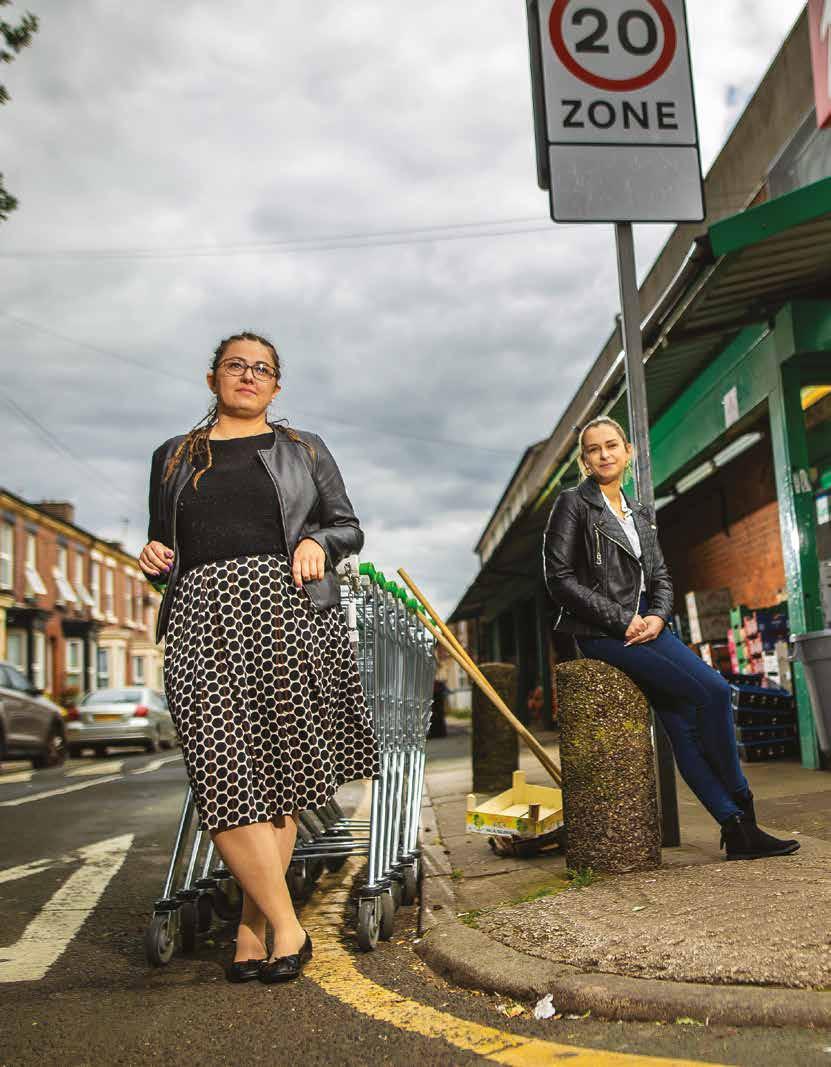
4 minute read
REACHING OUT TO ROMA
Samy lordan is 19. He enjoys modelling, but right now he’s a role model, helping young people from Liverpool’s Roma community to integrate.

Sammy lordan
It’s a tough task. Roma are notoriously wary of outsiders. Originally from India, they migrated to Europe, were forced to settle in Eastern Europe, and have been ostracised and persecuted around the world for centuries. Their mistrust and fear stops them engaging with those who could help them integrate.
In Liverpool things are different. Bianca Oprea has been Mersey Care’s link worker* for the Romanian community in Liverpool for two years. She’s had to work hard to win the hearts and minds of the Roma.
Her biggest ally is Alexandra Bahor, a member of the Roma community and its community development worker for Granby Toxteth Development Trust. Their passion for improving the lives of those they serve is infectious.
Their differences are what makes the partnership special, says Bianca.
“Alexandra is Roma, I’m not. Yet we’re working together, supporting each other’s community. We’re setting an example and sending a message to people that they can trust each other. It’s telling them we won’t judge, that we’re here to support them. We always start conversations with ‘how can I help’?”
Bianca’s role is to engage people with health services. While most Eastern European families don’t have the perilous journeys of refugees – resettlement programmes give them the right to live and work here – they still face challenges.
The Roma community is the biggest ethnic minority group in Europe. Their history is one of persecution and discrimination, to this day. Yet in Liverpool the Roma population is growing and thriving. We talk to the community workers leading by example.
“In Eastern Europe healthcare is bought, so health is a low priority. Mental health issues carry so much stigma that they’re not talked about until someone becomes acutely unwell,” says Bianca.
Language and cultural barriers make Roma people reluctant to register with a GP. That’s where she can help. “They’ve not had schooling so their literacy levels are low, they’re afraid, they fear having to fill in forms. All these things have a detrimental effect on their health,” she says.
“Because we have their trust we can explain the importance of prevention and help them get the care they need.”
Alexandra was a peer mentor in Budapest before coming to the UK. She oozes passion and talks animatedly about what’s happening in the Toxteth area. There’s a sense she doesn’t switch off from the job – it’s her life. She loves her community and is delighted that Bianca is there to concentrate on their health needs. “She’s made a big difference, people know she won’t judge them.”

Pictured left to right: Bianca Oprea and Alexandra Bahor
Bianca says people from Eastern Europe are often misrepresented. “It’s easy to label people. We speak loud and we love our traditions. But we also want to integrate, study, work and contribute”. T
here’s no better example than outreach worker Samy. He was 15 when his family came to the UK from Spain to find work. His first language is Spanish, so he had to adapt quickly. He volunteered and is now working for Granby Toxteth Development Trust.
“I was bullied a bit at school, but we were made welcome, and Alexandra helped us so much. I’m now doing the same, helping people get past the language barrier and speak to services. I miss the sun but I love it here,” he said.
Alexandra tells of a young Roma boy and girl who have recently enrolled as police cadets. She couldn’t be more proud of what she sees as aspirational role models to their peers.
“There’s been a massive change. We’ve shown them there’s only help and support. This is a growing community, Roma people are moving to Liverpool from other countries and cities. They feel safe here; it’s like a big family.”
The biggest challenge since the pandemic is being unable to have face to face contact. But Bianca says Roma families are still receiving support remotely via telephone consultations.
Good things are happening within the community. Parents are getting involved with their children’s schools. Younger people are studying, some gaining university places.
Health taboos are also fading. At one time going to an antenatal class would have been unthinkable. With Bianca’s encouragement Roma mums are now attending specialised antenatal sessions at Liverpool Women’s Hospital.
WHAT’S THE HOPE FOR THE FUTURE?
Alexandra and Bianca share the same vision – to empower the people they support to be actively involved in their own health and wellbeing journey. Says Bianca: “If that happens they can become community champions, which creates a ripple effect – they’re giving back to their communities.”










